Organisational Behaviour Essay: Motivation at Work and Leadership
VerifiedAdded on 2022/12/29
|7
|1519
|54
Essay
AI Summary
This essay examines the interconnected concepts of motivation at work and leadership within the framework of organisational behaviour. The author, drawing from personal experiences and established theories like Herzberg's Dual-Factor Theory, emphasizes the crucial role of positive motivation in fostering employee engagement and loyalty. The essay highlights the significance of effective leadership in guiding teams, influencing behaviours, and achieving organisational goals, emphasizing the importance of selecting and developing competent leaders. The author reflects on the impact of leadership on team dynamics and overall organisational success. The paper concludes by reiterating the need for strong leadership to cultivate effective leaders. The essay covers aspects of leadership and motivation in the workplace and their impact on employee performance and organisational objectives.
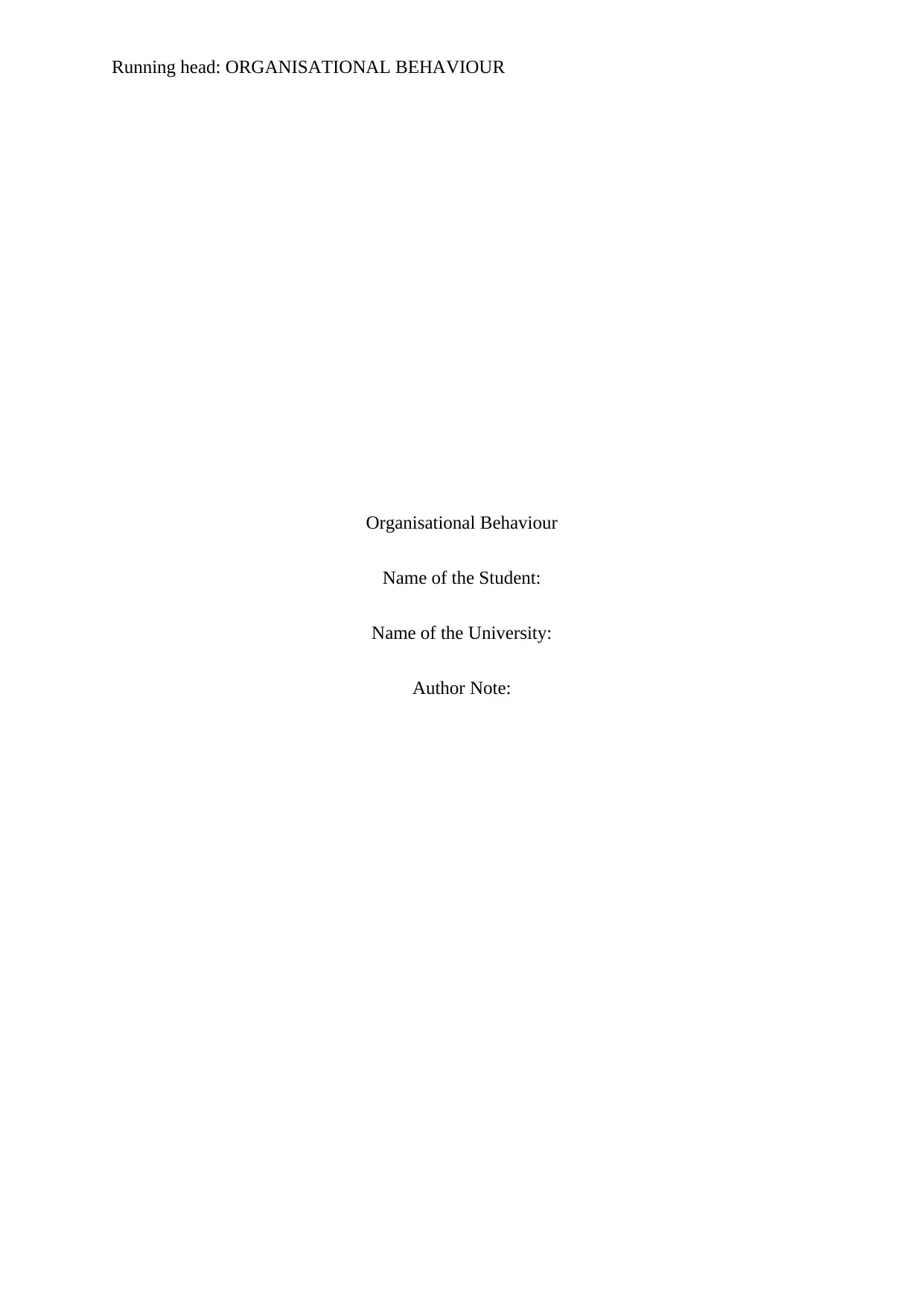
Running head: ORGANISATIONAL BEHAVIOUR
Organisational Behaviour
Name of the Student:
Name of the University:
Author Note:
Organisational Behaviour
Name of the Student:
Name of the University:
Author Note:
Paraphrase This Document
Need a fresh take? Get an instant paraphrase of this document with our AI Paraphraser
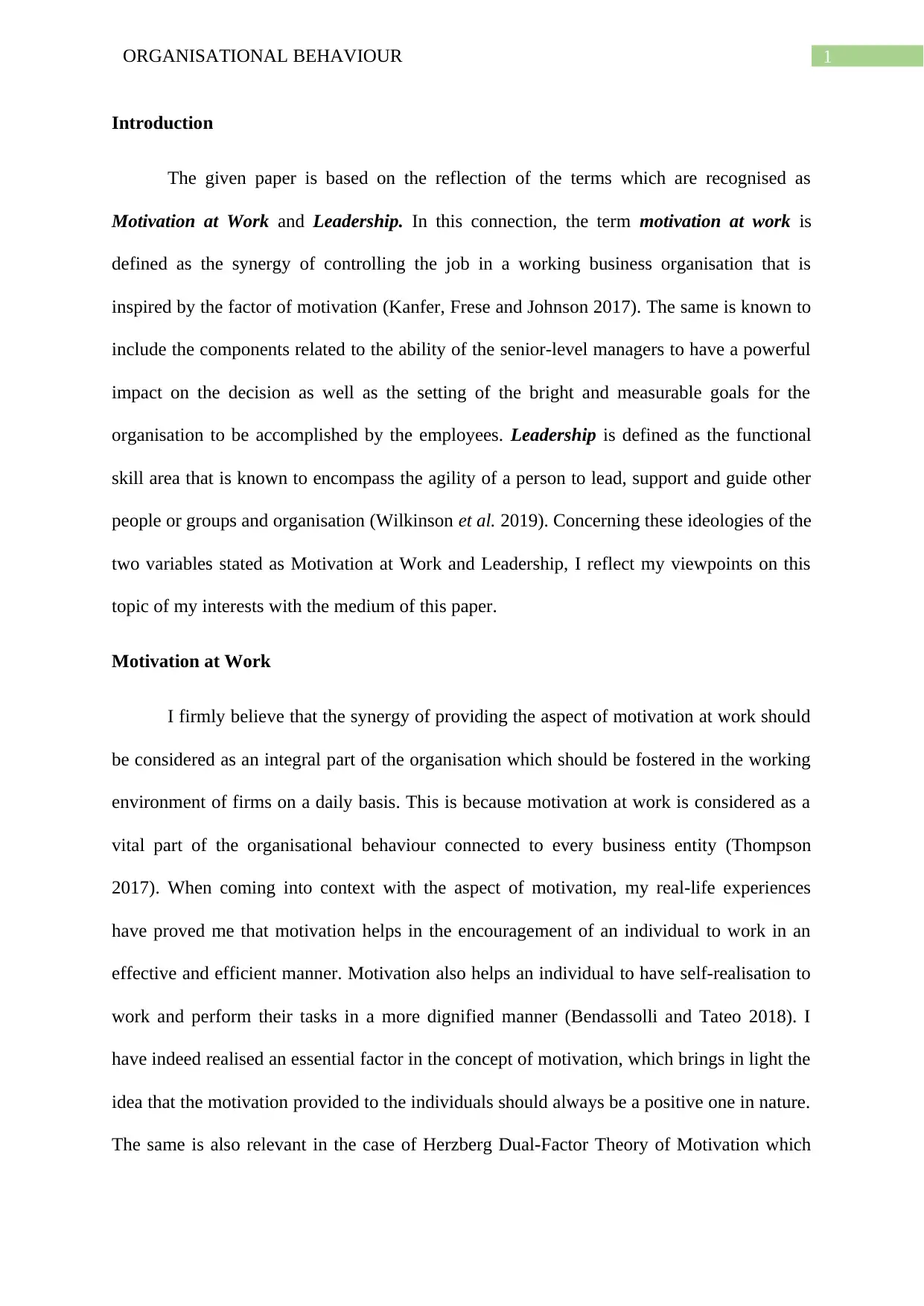
1ORGANISATIONAL BEHAVIOUR
Introduction
The given paper is based on the reflection of the terms which are recognised as
Motivation at Work and Leadership. In this connection, the term motivation at work is
defined as the synergy of controlling the job in a working business organisation that is
inspired by the factor of motivation (Kanfer, Frese and Johnson 2017). The same is known to
include the components related to the ability of the senior-level managers to have a powerful
impact on the decision as well as the setting of the bright and measurable goals for the
organisation to be accomplished by the employees. Leadership is defined as the functional
skill area that is known to encompass the agility of a person to lead, support and guide other
people or groups and organisation (Wilkinson et al. 2019). Concerning these ideologies of the
two variables stated as Motivation at Work and Leadership, I reflect my viewpoints on this
topic of my interests with the medium of this paper.
Motivation at Work
I firmly believe that the synergy of providing the aspect of motivation at work should
be considered as an integral part of the organisation which should be fostered in the working
environment of firms on a daily basis. This is because motivation at work is considered as a
vital part of the organisational behaviour connected to every business entity (Thompson
2017). When coming into context with the aspect of motivation, my real-life experiences
have proved me that motivation helps in the encouragement of an individual to work in an
effective and efficient manner. Motivation also helps an individual to have self-realisation to
work and perform their tasks in a more dignified manner (Bendassolli and Tateo 2018). I
have indeed realised an essential factor in the concept of motivation, which brings in light the
idea that the motivation provided to the individuals should always be a positive one in nature.
The same is also relevant in the case of Herzberg Dual-Factor Theory of Motivation which
Introduction
The given paper is based on the reflection of the terms which are recognised as
Motivation at Work and Leadership. In this connection, the term motivation at work is
defined as the synergy of controlling the job in a working business organisation that is
inspired by the factor of motivation (Kanfer, Frese and Johnson 2017). The same is known to
include the components related to the ability of the senior-level managers to have a powerful
impact on the decision as well as the setting of the bright and measurable goals for the
organisation to be accomplished by the employees. Leadership is defined as the functional
skill area that is known to encompass the agility of a person to lead, support and guide other
people or groups and organisation (Wilkinson et al. 2019). Concerning these ideologies of the
two variables stated as Motivation at Work and Leadership, I reflect my viewpoints on this
topic of my interests with the medium of this paper.
Motivation at Work
I firmly believe that the synergy of providing the aspect of motivation at work should
be considered as an integral part of the organisation which should be fostered in the working
environment of firms on a daily basis. This is because motivation at work is considered as a
vital part of the organisational behaviour connected to every business entity (Thompson
2017). When coming into context with the aspect of motivation, my real-life experiences
have proved me that motivation helps in the encouragement of an individual to work in an
effective and efficient manner. Motivation also helps an individual to have self-realisation to
work and perform their tasks in a more dignified manner (Bendassolli and Tateo 2018). I
have indeed realised an essential factor in the concept of motivation, which brings in light the
idea that the motivation provided to the individuals should always be a positive one in nature.
The same is also relevant in the case of Herzberg Dual-Factor Theory of Motivation which
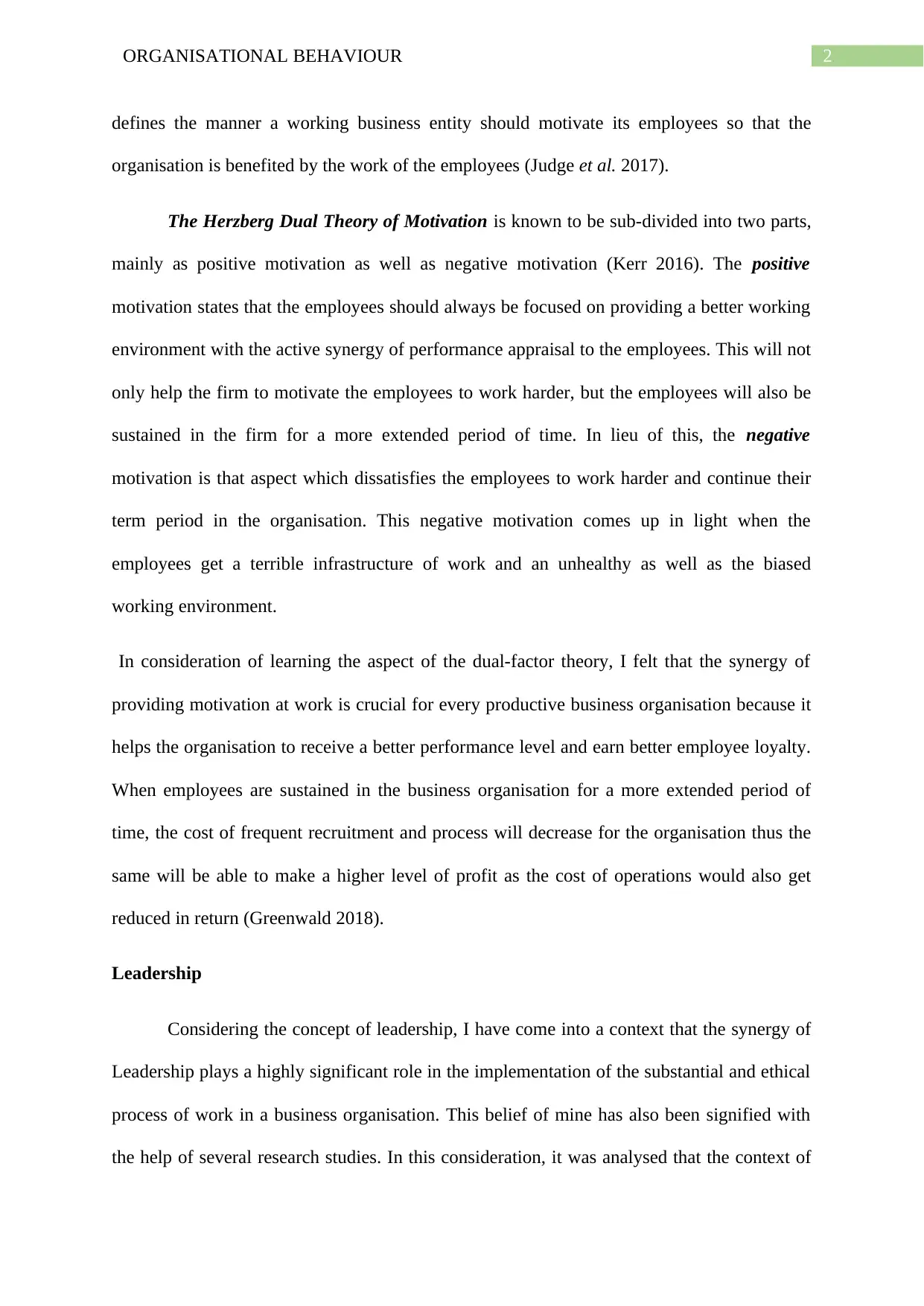
2ORGANISATIONAL BEHAVIOUR
defines the manner a working business entity should motivate its employees so that the
organisation is benefited by the work of the employees (Judge et al. 2017).
The Herzberg Dual Theory of Motivation is known to be sub-divided into two parts,
mainly as positive motivation as well as negative motivation (Kerr 2016). The positive
motivation states that the employees should always be focused on providing a better working
environment with the active synergy of performance appraisal to the employees. This will not
only help the firm to motivate the employees to work harder, but the employees will also be
sustained in the firm for a more extended period of time. In lieu of this, the negative
motivation is that aspect which dissatisfies the employees to work harder and continue their
term period in the organisation. This negative motivation comes up in light when the
employees get a terrible infrastructure of work and an unhealthy as well as the biased
working environment.
In consideration of learning the aspect of the dual-factor theory, I felt that the synergy of
providing motivation at work is crucial for every productive business organisation because it
helps the organisation to receive a better performance level and earn better employee loyalty.
When employees are sustained in the business organisation for a more extended period of
time, the cost of frequent recruitment and process will decrease for the organisation thus the
same will be able to make a higher level of profit as the cost of operations would also get
reduced in return (Greenwald 2018).
Leadership
Considering the concept of leadership, I have come into a context that the synergy of
Leadership plays a highly significant role in the implementation of the substantial and ethical
process of work in a business organisation. This belief of mine has also been signified with
the help of several research studies. In this consideration, it was analysed that the context of
defines the manner a working business entity should motivate its employees so that the
organisation is benefited by the work of the employees (Judge et al. 2017).
The Herzberg Dual Theory of Motivation is known to be sub-divided into two parts,
mainly as positive motivation as well as negative motivation (Kerr 2016). The positive
motivation states that the employees should always be focused on providing a better working
environment with the active synergy of performance appraisal to the employees. This will not
only help the firm to motivate the employees to work harder, but the employees will also be
sustained in the firm for a more extended period of time. In lieu of this, the negative
motivation is that aspect which dissatisfies the employees to work harder and continue their
term period in the organisation. This negative motivation comes up in light when the
employees get a terrible infrastructure of work and an unhealthy as well as the biased
working environment.
In consideration of learning the aspect of the dual-factor theory, I felt that the synergy of
providing motivation at work is crucial for every productive business organisation because it
helps the organisation to receive a better performance level and earn better employee loyalty.
When employees are sustained in the business organisation for a more extended period of
time, the cost of frequent recruitment and process will decrease for the organisation thus the
same will be able to make a higher level of profit as the cost of operations would also get
reduced in return (Greenwald 2018).
Leadership
Considering the concept of leadership, I have come into a context that the synergy of
Leadership plays a highly significant role in the implementation of the substantial and ethical
process of work in a business organisation. This belief of mine has also been signified with
the help of several research studies. In this consideration, it was analysed that the context of
⊘ This is a preview!⊘
Do you want full access?
Subscribe today to unlock all pages.

Trusted by 1+ million students worldwide
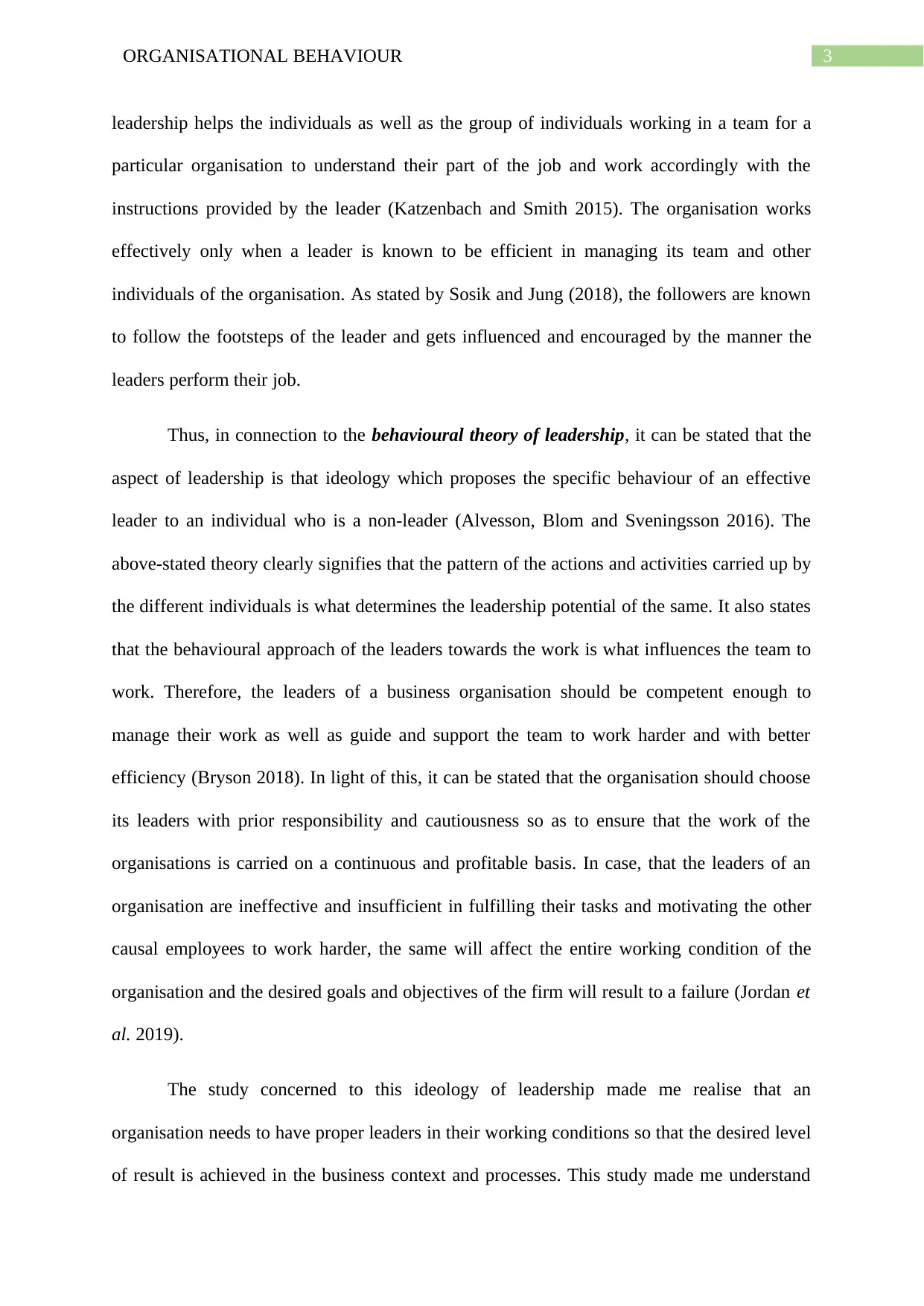
3ORGANISATIONAL BEHAVIOUR
leadership helps the individuals as well as the group of individuals working in a team for a
particular organisation to understand their part of the job and work accordingly with the
instructions provided by the leader (Katzenbach and Smith 2015). The organisation works
effectively only when a leader is known to be efficient in managing its team and other
individuals of the organisation. As stated by Sosik and Jung (2018), the followers are known
to follow the footsteps of the leader and gets influenced and encouraged by the manner the
leaders perform their job.
Thus, in connection to the behavioural theory of leadership, it can be stated that the
aspect of leadership is that ideology which proposes the specific behaviour of an effective
leader to an individual who is a non-leader (Alvesson, Blom and Sveningsson 2016). The
above-stated theory clearly signifies that the pattern of the actions and activities carried up by
the different individuals is what determines the leadership potential of the same. It also states
that the behavioural approach of the leaders towards the work is what influences the team to
work. Therefore, the leaders of a business organisation should be competent enough to
manage their work as well as guide and support the team to work harder and with better
efficiency (Bryson 2018). In light of this, it can be stated that the organisation should choose
its leaders with prior responsibility and cautiousness so as to ensure that the work of the
organisations is carried on a continuous and profitable basis. In case, that the leaders of an
organisation are ineffective and insufficient in fulfilling their tasks and motivating the other
causal employees to work harder, the same will affect the entire working condition of the
organisation and the desired goals and objectives of the firm will result to a failure (Jordan et
al. 2019).
The study concerned to this ideology of leadership made me realise that an
organisation needs to have proper leaders in their working conditions so that the desired level
of result is achieved in the business context and processes. This study made me understand
leadership helps the individuals as well as the group of individuals working in a team for a
particular organisation to understand their part of the job and work accordingly with the
instructions provided by the leader (Katzenbach and Smith 2015). The organisation works
effectively only when a leader is known to be efficient in managing its team and other
individuals of the organisation. As stated by Sosik and Jung (2018), the followers are known
to follow the footsteps of the leader and gets influenced and encouraged by the manner the
leaders perform their job.
Thus, in connection to the behavioural theory of leadership, it can be stated that the
aspect of leadership is that ideology which proposes the specific behaviour of an effective
leader to an individual who is a non-leader (Alvesson, Blom and Sveningsson 2016). The
above-stated theory clearly signifies that the pattern of the actions and activities carried up by
the different individuals is what determines the leadership potential of the same. It also states
that the behavioural approach of the leaders towards the work is what influences the team to
work. Therefore, the leaders of a business organisation should be competent enough to
manage their work as well as guide and support the team to work harder and with better
efficiency (Bryson 2018). In light of this, it can be stated that the organisation should choose
its leaders with prior responsibility and cautiousness so as to ensure that the work of the
organisations is carried on a continuous and profitable basis. In case, that the leaders of an
organisation are ineffective and insufficient in fulfilling their tasks and motivating the other
causal employees to work harder, the same will affect the entire working condition of the
organisation and the desired goals and objectives of the firm will result to a failure (Jordan et
al. 2019).
The study concerned to this ideology of leadership made me realise that an
organisation needs to have proper leaders in their working conditions so that the desired level
of result is achieved in the business context and processes. This study made me understand
Paraphrase This Document
Need a fresh take? Get an instant paraphrase of this document with our AI Paraphraser
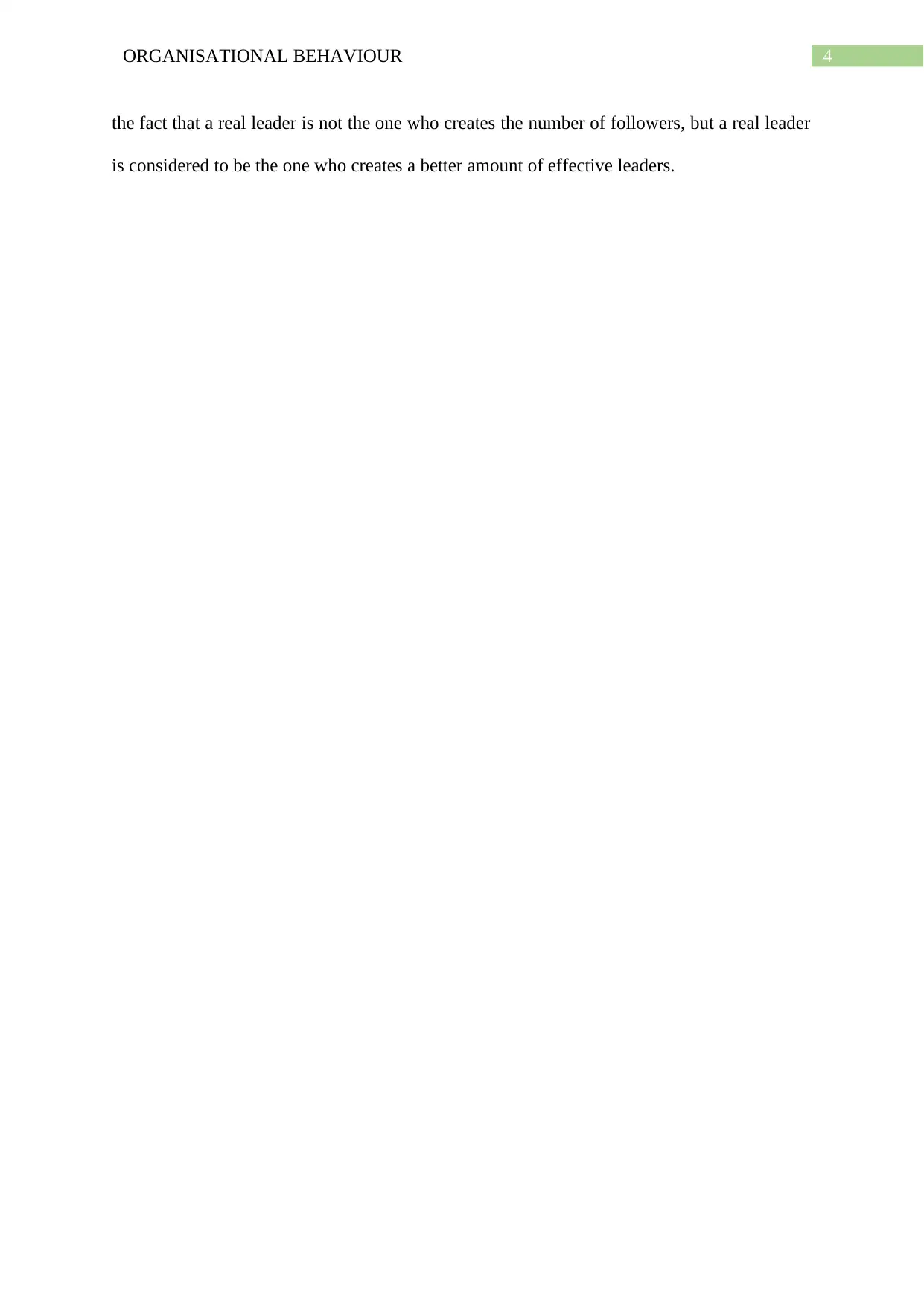
4ORGANISATIONAL BEHAVIOUR
the fact that a real leader is not the one who creates the number of followers, but a real leader
is considered to be the one who creates a better amount of effective leaders.
the fact that a real leader is not the one who creates the number of followers, but a real leader
is considered to be the one who creates a better amount of effective leaders.
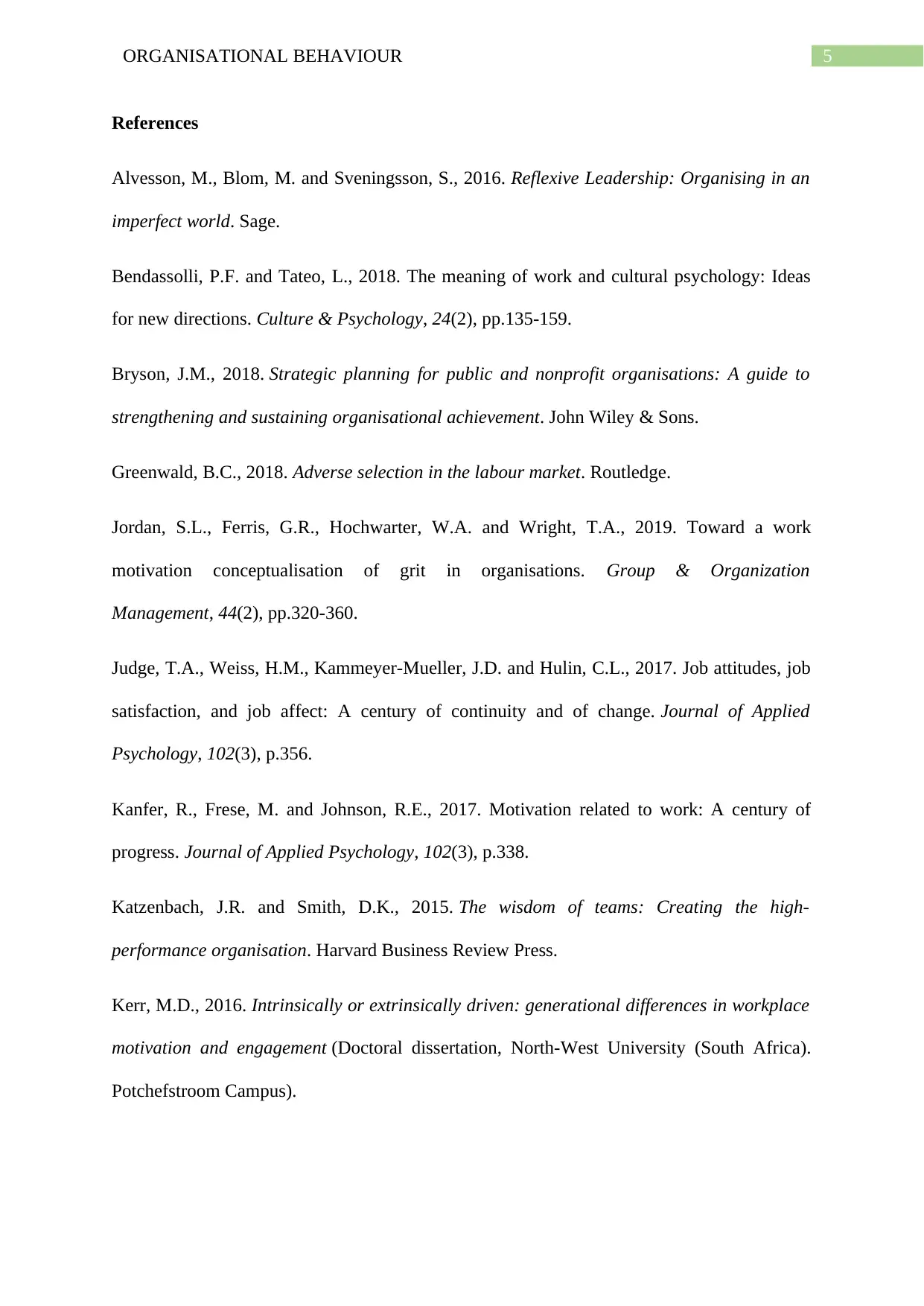
5ORGANISATIONAL BEHAVIOUR
References
Alvesson, M., Blom, M. and Sveningsson, S., 2016. Reflexive Leadership: Organising in an
imperfect world. Sage.
Bendassolli, P.F. and Tateo, L., 2018. The meaning of work and cultural psychology: Ideas
for new directions. Culture & Psychology, 24(2), pp.135-159.
Bryson, J.M., 2018. Strategic planning for public and nonprofit organisations: A guide to
strengthening and sustaining organisational achievement. John Wiley & Sons.
Greenwald, B.C., 2018. Adverse selection in the labour market. Routledge.
Jordan, S.L., Ferris, G.R., Hochwarter, W.A. and Wright, T.A., 2019. Toward a work
motivation conceptualisation of grit in organisations. Group & Organization
Management, 44(2), pp.320-360.
Judge, T.A., Weiss, H.M., Kammeyer-Mueller, J.D. and Hulin, C.L., 2017. Job attitudes, job
satisfaction, and job affect: A century of continuity and of change. Journal of Applied
Psychology, 102(3), p.356.
Kanfer, R., Frese, M. and Johnson, R.E., 2017. Motivation related to work: A century of
progress. Journal of Applied Psychology, 102(3), p.338.
Katzenbach, J.R. and Smith, D.K., 2015. The wisdom of teams: Creating the high-
performance organisation. Harvard Business Review Press.
Kerr, M.D., 2016. Intrinsically or extrinsically driven: generational differences in workplace
motivation and engagement (Doctoral dissertation, North-West University (South Africa).
Potchefstroom Campus).
References
Alvesson, M., Blom, M. and Sveningsson, S., 2016. Reflexive Leadership: Organising in an
imperfect world. Sage.
Bendassolli, P.F. and Tateo, L., 2018. The meaning of work and cultural psychology: Ideas
for new directions. Culture & Psychology, 24(2), pp.135-159.
Bryson, J.M., 2018. Strategic planning for public and nonprofit organisations: A guide to
strengthening and sustaining organisational achievement. John Wiley & Sons.
Greenwald, B.C., 2018. Adverse selection in the labour market. Routledge.
Jordan, S.L., Ferris, G.R., Hochwarter, W.A. and Wright, T.A., 2019. Toward a work
motivation conceptualisation of grit in organisations. Group & Organization
Management, 44(2), pp.320-360.
Judge, T.A., Weiss, H.M., Kammeyer-Mueller, J.D. and Hulin, C.L., 2017. Job attitudes, job
satisfaction, and job affect: A century of continuity and of change. Journal of Applied
Psychology, 102(3), p.356.
Kanfer, R., Frese, M. and Johnson, R.E., 2017. Motivation related to work: A century of
progress. Journal of Applied Psychology, 102(3), p.338.
Katzenbach, J.R. and Smith, D.K., 2015. The wisdom of teams: Creating the high-
performance organisation. Harvard Business Review Press.
Kerr, M.D., 2016. Intrinsically or extrinsically driven: generational differences in workplace
motivation and engagement (Doctoral dissertation, North-West University (South Africa).
Potchefstroom Campus).
⊘ This is a preview!⊘
Do you want full access?
Subscribe today to unlock all pages.

Trusted by 1+ million students worldwide
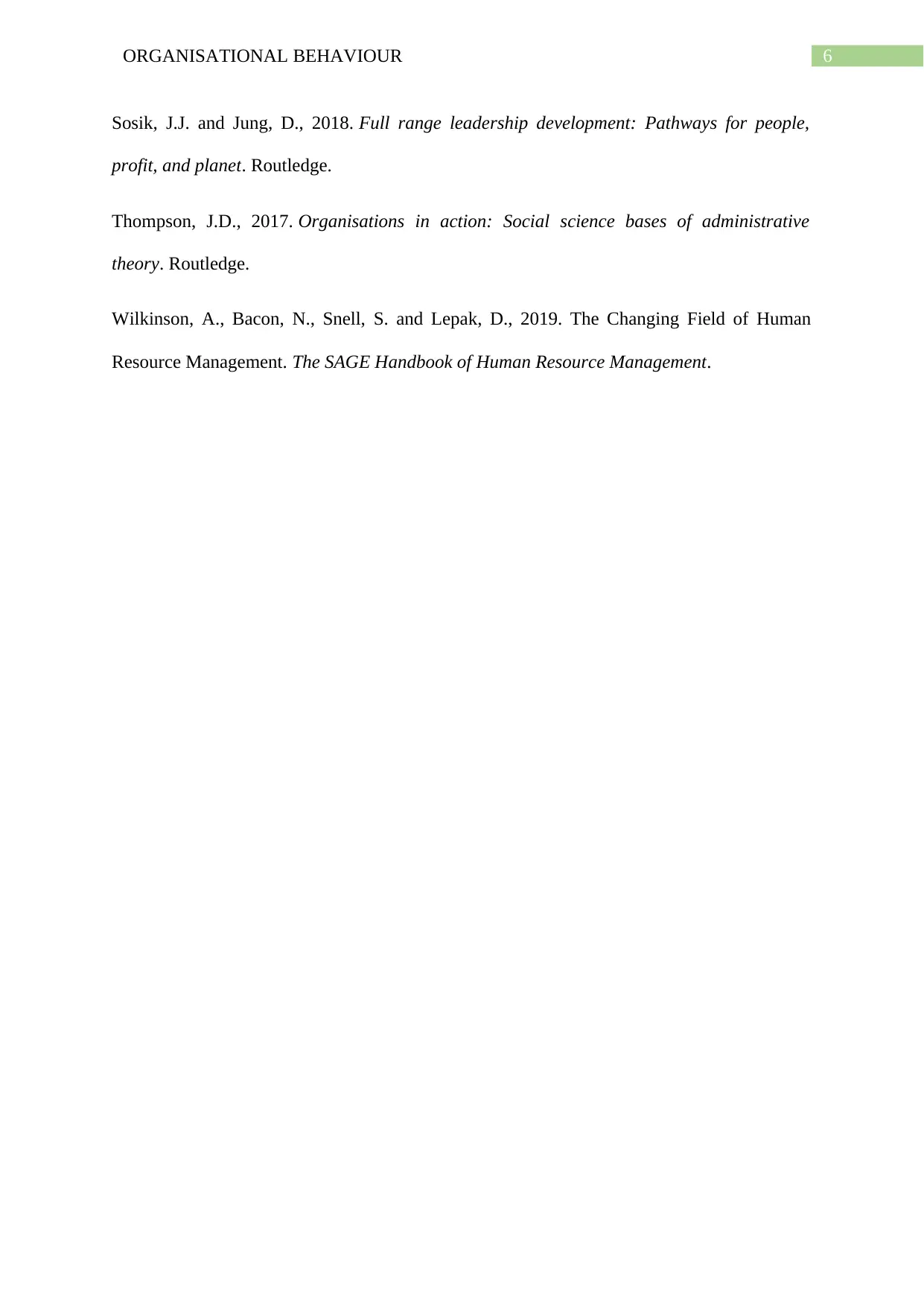
6ORGANISATIONAL BEHAVIOUR
Sosik, J.J. and Jung, D., 2018. Full range leadership development: Pathways for people,
profit, and planet. Routledge.
Thompson, J.D., 2017. Organisations in action: Social science bases of administrative
theory. Routledge.
Wilkinson, A., Bacon, N., Snell, S. and Lepak, D., 2019. The Changing Field of Human
Resource Management. The SAGE Handbook of Human Resource Management.
Sosik, J.J. and Jung, D., 2018. Full range leadership development: Pathways for people,
profit, and planet. Routledge.
Thompson, J.D., 2017. Organisations in action: Social science bases of administrative
theory. Routledge.
Wilkinson, A., Bacon, N., Snell, S. and Lepak, D., 2019. The Changing Field of Human
Resource Management. The SAGE Handbook of Human Resource Management.
1 out of 7
Related Documents
Your All-in-One AI-Powered Toolkit for Academic Success.
+13062052269
info@desklib.com
Available 24*7 on WhatsApp / Email
![[object Object]](/_next/static/media/star-bottom.7253800d.svg)
Unlock your academic potential
Copyright © 2020–2025 A2Z Services. All Rights Reserved. Developed and managed by ZUCOL.




